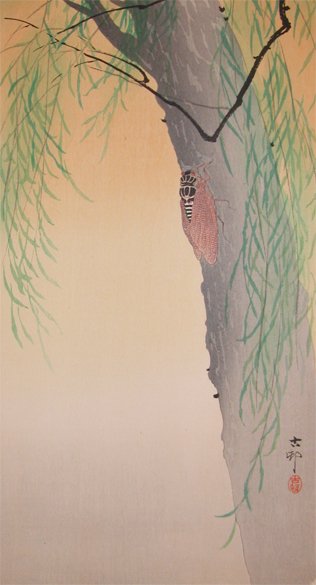The End of the Cicada ~ Haiku of Japan
Towards the end of autumn in 1817, around the same time as now, Issa listened to the end of the cicada as we are now, then wrote:
naku semi mo tsurete fuwari to hito ha kana
also, softly
one leaf falls
—Issa


I've covered the cicada several times this year, in photos and in haiku of my own and translations from the masters. So how about one more, as we enter their fading time.
Cicada (semi) is usually a kigo(season word) for summer, but in this haiku the kigo is "one leaf", which in haiku shorthand refers to the paulownia leaf which is much beloved in Japanese poetry, in part because it's pattern of 3 and 5 leaves echos the typical verse structure in Japanese poetry. It is a kigo for early autumn.
There is some hidden symbolism here. In old China it was written that when the paulownia leaf falls the world's autumn is known, "autumn" in this case being the end of a dynasty, suggesting the conflict that brings about the next one. So there is a feeling and suggestion of sadness at the end of things.
Japan was nominally ruled by the same family from the beginning of the country so offically there was only one dynasty in the long history of the country, but in practice there have been a number of families or dynasties that actually ruled and held ultimate power. One of them that came to power in the sixteenth century, the Toyotomi family led by Hideyoshi, coincidentally used the paulownia leaf as their family crest. And fittingly enough, Hideyoshi's "dynasty" didn't last long and was soon supplanted by the Tokugawa clan.
We can see this suggestion of sadness in this haiku more directly with the cicada whose time is over and is ending, making it their autumn. From this point forward they will grow less and less until they disappear for the year.
As we transition from the sweltering heat of summer (it's been a horrible one in Japan this year) into the first whispers of autumn, the art of haiku allows us to pause and reflect on the natural world and the cycles of life. Issa's haiku captures not just the ending of a season but the closing chapter of life as symbolized by the cicada and the paulownia leaf. The cicada's song grows softer, the leaf falls, and we're reminded of the impermanence of life and the beauty that surrounds us, summed up by the Japanese phrase that many of you may know: mono no aware, "the pathos of things". Just like Issa, we too can find deeper meanings in these fleeting moments, seeing them as echoes of larger cycles—of families, of dynasties, and of life itself.
It's in these subtle layers that the beauty of haiku truly shines. Whether you're new to the form or a long-time admirer, may the change of seasons bring you a fresh perspective, just as it did for Issa over two centuries ago.
❦
 |
David LaSpina is an American photographer and translator lost in Japan, trying to capture the beauty of this country one photo at a time and searching for the perfect haiku. |
That is, me! If you like this translation, feel free to use it. Just credit me. Also link here if you can. ↩
I for one am also ready for the cooler weather. We had like a fake fall for a week or so, then the heat and humidity came back with a vengeance. It looks like it is finally supposed to break tomorrow. I really enjoyed this Haiku.
That's pretty normal, isn't it? I remember in Indiana we'd always get at least once false-autumn followed by an indian summer for a few weeks before autumn came for good.
I am looking forward to it. Summer is always so brutal. Hopefully autumn lasts a while before we dive right into winter.
This is even worse than Indian Summer. I think it is finally breaking today though.
Paulownia, you fall on the fate of a new closed cycle, your descent marks the beginning of the cold and the withering of summer.
Paulownia dies and rises again, cycle, cycle, cycle.
Some verses inspired by your review of very interesting data and a beautiful haiku
Thanks for sharing.
Good day.
Thanks for reading!
Beautiful haiku. I often feel that Issa's haiku is very delicate. Most haiku poets sound very sensitive and delicate, though.
I hope we can keep our beautiful four seasons, especially spring and autumn. I mean, our temperature and weather are becoming too extreme these days... I don't want to be negative, but I feel our spring and autumn are shorter than before. Or maybe my sense of seasonal feelings is changing as well... Anyway, thank you for selecting a nice haiku for all the time. I like your original haiku as well!
Yeah spring and autumn are vanishing as climate change affects everything. But I hope they can continue a little. Both are so beautiful and nice.
Glad you enjoyed the haiku!
This post is teeming with beauty of the mono no aware variety. Really enjoyed reading it. Thank you for delving deeply into haiku for us. I'm learning a lot.
And, it's a lovely haiku. I wouldn't have seen nearly so much without your explanation.